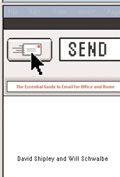
David Shipley and Will Schwalby
Reviewed by: Gregory E. Reynolds
Send: The Essential Guide to Email for Office and Home, by David Shipley and Will Schwalbe. Published by Alfred A. Knopf, 2007. Hardback, 247 pages, list price $19.95. Reviewed by OP pastor Gregory E. Reynolds. A longer review is published in Ordained Servant.
Have you ever sent a confidential e-mail to the wrong person? When church officers do that, it can be disastrous. David Shipley and Will Schwalbe will help you avoid such pitfalls. The authors are genuine media ecologists - observing the medium of electronic mail and insightfully assessing its benefits and liabilities, with recommendations on how to embrace the former and avoid the latter: "Seven Big Reasons to Love Email" (pp. 17-20), "Eight Reasons You May Not Want to Email" (pp. 22-29), and "Seven Big Reasons to Use the Telephone Instead of Email" (pp. 42-43). The book is full of memorable rules of thumb, such the telephone is often more efficient and always more personal.
This is a long-overdue book of etiquette for e-mail users. Shipley and Schwalbe demonstrate a keen perception of the unique "messages" built into every medium. For example: "We remember that letters are permanent and so tend to use our best spelling and grammar." And: "We also email fast - too fast" (p. 10). E-mail's lack of face-to-face perceptions tends to undermine "social intelligence" (p. 11). There can be no doubt that the authors have read McLuhan. "How you send something can have a profound impact on what you're sending. Your method of delivery sends a message of its own" (p. 15). "It's really a matter of taking the time to consider the strengths and weaknesses of each form of communication before committing to one" (p. 16).
Shipley and Schwalbe are high on the personal, sometimes with a nice touch of humor: "Don't forget to show up sometimes" (p. 50). The golden rule of communication technologies is: "Never do anything electronically that you would want others to do to you in person" (p. 51).
The authors are also fans of good form. They have an eye for protecting reputations, feelings, and privacy, and observing good manners. The ease and speed of e-mail tend to foster sloppiness and breed informality. Thus, extra caution is necessary. This book is full of things we tend to ignore, like the subject line. Using concise, specific information makes your e-mail stand out from the mob. Above all, remember that everything you send is potentially permanent and potentially public.
I used to think that the "Hi" or "Hello" that so many people use as a greeting, whether or not they know you, was a new form I needed to adjust to. Not so! "Dear" is still preferred, unless you are on familiar terms. As it turns out, many of the things I learned about letter writing in school still pertain to e-mail, at least when it comes to initial contacts. On the other hand, with the proper header, an exchange may be efficiently carried on with single sentences, phrases, or words. This is a benefit of the efficiency and speed of e-mail.
Good grammar is important. Again, the informality of e-mail tends toward poor grammar. Poor grammar and misused words reflect poorly on you and detract from the effectiveness of your message. This has not changed with technology.
Even sages, however, have blind spots. Shipley and Schwalbe are far too sanguine about instant messaging (IM) and multitasking - a euphemism for trying to work with distractions. The lack of concentration in our work makes us not only inefficient, but often ineffective. The authors distinguish between checking e-mail during a meeting and sending a document pertinent to the meeting during the meeting. Fair enough, but I remain a skeptic.
Shipley and Schwalbe conclude with two memorable aphorisms: "Think before you send. Send email you would like to receive" (p. 222). Loaded with sagacious advice for the everyday e-mail user, this book will save you lots of grief. Miss Manners could not have done better.
April 27, 2025
The Devoted Mind: Seeking God’s Face in a World of Distraction
April 20, 2025
April 13, 2025
Suffering: God’s Purpose in Our Pain
April 06, 2025
Sunday Matters: 52 Devotionals to Prepare Your Heart for Church
March 30, 2025
On the Trail with a Missionary
March 23, 2025
Midnight Mercies: Walking with God Through Depression in Motherhood
March 16, 2025
© 2025 The Orthodox Presbyterian Church